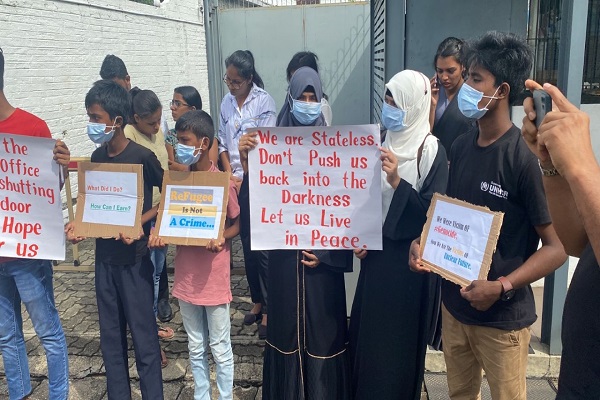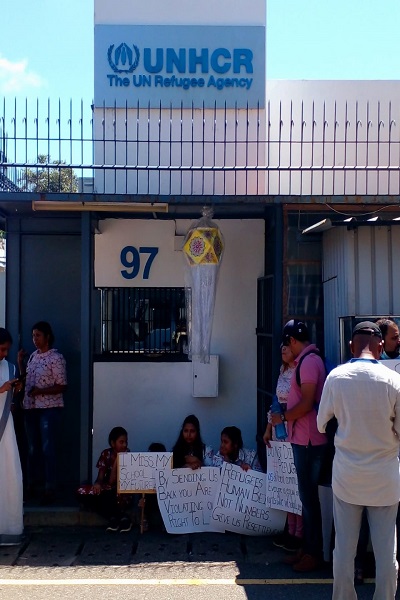By Mimi Alphonsus
World Refugee Day falls on June 20th, but this year celebrations are subdued as UNHCR, the UN’s refugee agency, has decided to exit Sri Lanka leaving the 500 or so refugees and asylum seekers in the lurch.
Sri Lanka is not a signatory to the 1951 UN Refugee Convention meaning that refugees and asylum seekers who make it here cannot stay permanently. Ultimately, they will have to be resettled in a third country, a process that UNHCR used to undertake. But now the UNHCR is essentially closing shop in Sri Lanka and has declared that they will not be processing asylum applications for 176 registered asylum seekers. Even those who have been granted refugee status have been waiting for years, even decades, for resettlement. Most are from Pakistan’s minority Ahmaddiya and Myanmar’s stateless Rohingya communities.
It is difficult coping with the uncertain future, but struggle is not new. “The life of a refugee is a life of struggle,” said a Rohingya refugee who requested anonymity, “legally I cannot work and make any money. Local people with kind hearts support me for my rent and utilities but not always.” Refugees in Sri Lanka are unable to work legally. For a while refugees received an allowance from UNHCR and private donors supported asylum seekers who were still going through the refugee determination process. But now UNHCR has stopped allowances and charitable money is not steady.
“Many families only eat one or two meals a day,” said Ransy Gunawardana, who has worked with refugees and asylum seekers for nearly five years through the National Fisheries Solidarity Movement (NAFSO) “and even then it is just atta flour rotis.” Gunawardana says she has noticed that many have developed iron deficiencies and get sick regularly. Some refugees and asylum seekers have been in Sri Lanka for over ten years and Gunawardana says that the children have sadly become accustomed to regular malnutrition.
The lack of steady income has created an education and nutrition crisis among refugee children. According to Gunawardana approximately 70 children do not attend school. Since the government does not accept them into public school, private schools are the only option. But unable to pay the fees, only a few students receiving charity have the option to attend.
Quintus Colambage of NAFSO says that the Ministry of Health has helped secure access to healthcare. “They can get treated at the Negombo and Kalubowila hospitals,” said Quintus “midwives and public health inspectors run health programmes for them as well.”
However, Colambage worries that the dubious legal standing of refugees, especially now that UNHCR is leaving, is rendering them vulnerable. “Because they have no other option, some refugees take odd jobs but the bosses really exploit them,” he explained. Refugees who do work illegally are subjected to depressed wages and have no protections.
Sri Lanka has had a long relationship with refugees. For the most part we have been a sending country with hundreds of thousands fleeing the 30-year civil war to India, Europe and North America. Even today about 100,000 Sri Lankan Tamil refugees remain in India, many in refugee camps. But in 2006 Sri Lanka became a receiving country as well, signing an MOU with UNHCR. As per the MOU Sri Lanka would not deport individuals who were deemed by UNHCR to be “Persons Of Concern” (POC) and would let them remain until they received resettlement or their refugee status was rejected.
The problem is since last year UNHCR is no longer registering individuals as POCs which means those arriving in Sri Lanka fleeing civil war and persecution, share the same standing as any tourist overstaying their visa or running a business illegally. Sunday Times learned of one instance where a mother without POC status who recently gave birth in Sri Lanka refused to take her child to be vaccinated at the hospital out of fear of being caught and deported.
The Human Rights Commission of Sri Lanka (HRCSL) issued a statement for World Refugee Day this year, highlighting the plight of this community. They emphasised that the government of Sri Lanka has an obligation to stand by the principle of “non-refoulement”, which demands that states not transfer or remove individuals when there are “substantial grounds for believing that the person would be at risk of irreparable harm upon return.” HRCSL further urged the government to consider accepting the 1951 refugee convention and “formulate a comprehensive policy to ensure the protection and promotion of the human rights of all refugees and asylum-seekers in Sri Lanka.


Leave Comments